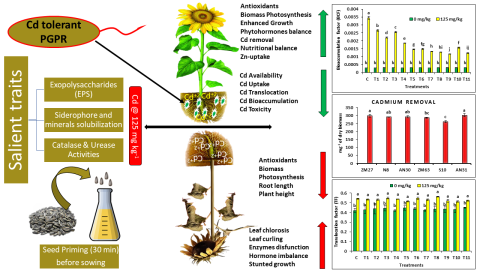You are here
Enhancing sunflower resilience: Zinc-solubilizing bacteria mitigate cadmium uptake and translocation
Pages :
-

Cadmium (Cd) is a highly hazardous metal known for its easy absorption and accumulation in plants, particularly in edible vegetable oils. Sunflower (Helianthus annuus L.) holds global significance as an oil crop. This study aims to assess the potential of zinc-solubilizing bacterial strains in reducing cadmium uptake by enhancing zinc availability in sunflower plants. For this investigation, we selected twelve pre-isolated zinc-solubilizing bacterial (ZSB) strains for screening against cadmium tolerance and were evaluated for their exopolysaccharides (EPS) and siderophore production capabilities. Four strains exhibiting excellent tolerance to cadmium, EPS production, and siderophore production were subsequently inoculated into sunflower plants to determine the cadmium concentration to determine EC50 at various cadmium levels (ranging from 0 to 200 mg kg-1). Following the compatibility assessment of these strains as single and consortium inoculation, sunflower seeds were cultivated in jars containing soil with two cadmium levels (0 and 125 mg kg-1), totaling 600 g of soil. Our findings demonstrated that the application of ZSB significantly enhanced sunflower growth while simultaneously reducing cadmium uptake. Particularly noteworthy was the performance of the bacterial consortium, composed of strains ZM27 and AN31, which resulted in a remarkable 96% reduction in cadmium translocation, an 86% decrease in cadmium bioaccumulation, and a 97% reduction in overall cadmium uptake compared to the control group. Moreover, the same treatment has caused increase in root length (21.6%), shoot length (18.8%), chlorophyll contents (23.5%), Zn in shoot (30.8%), root Zn contents (13.5%), seedling vigor (49.6%) and leaf area (23.1%) of sunflower under Cd stress as compared to control. The present study concludes that zinc-solubilizing bacterial strains, in consortium ZM27+AN31 were found effective in mitigating the adverse effects of cadmium uptake in sunflower plants. These results suggest that bacterial inoculation strategies hold significant promise for reducing cadmium content in sunflower crops, thereby enhancing the safety and suitability of sunflower-derived edible oils for human consumption and safeguarding human health.
